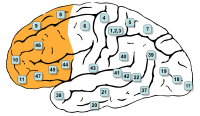
Photo from wikipedia
There is an emerging consensus that regular cannabis use may be detrimental to the developing brain, including potential long-lasting changes in executive functioning. Consequently, the present study examined neural activation… Click to show full abstract
There is an emerging consensus that regular cannabis use may be detrimental to the developing brain, including potential long-lasting changes in executive functioning. Consequently, the present study examined neural activation and performance on a working memory n-back task using functional magnetic resonance imaging (fMRI) in a sample of young adults (ages 19 to 21) from a longitudinal research sample. Regular cannabis users ( n = 10) were compared with non-regular cannabis user controls ( n = 14) while completing the letter n-back task during fMRI. While there were no differences across performance indices, imaging parameters showed significant differences in brain activation during task performance. Specifically, there was evidence of increased activation in the left and right temporal lobes and the right superior frontal cortex in cannabis users, including significantly altered functional connectivity between these areas. Functional connectivity analyses also showed differences in expected patterns of connectivity in both working memory and reward circuitries among cannabis users, possibly reflecting compensatory mechanisms as a result of sustained use.
Journal Title: International Journal of Mental Health and Addiction
Year Published: 2020
Link to full text (if available)
Share on Social Media: Sign Up to like & get
recommendations!